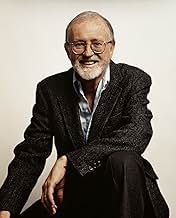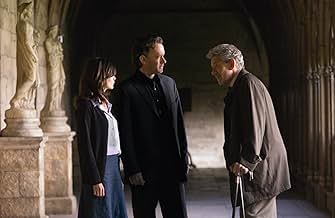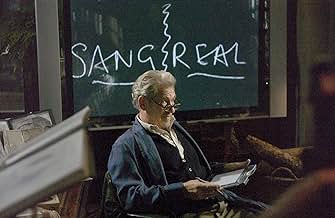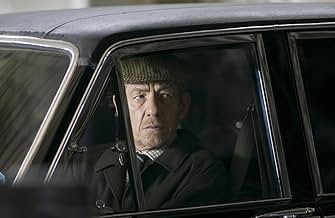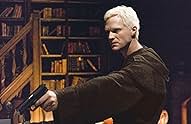Un assassinio all'interno del museo del Louvre ed indizi nascosti nei soui dipinto conducono alla scoperta di un mistero celato da una società segreta religiosa da più di duemila anni.Un assassinio all'interno del museo del Louvre ed indizi nascosti nei soui dipinto conducono alla scoperta di un mistero celato da una società segreta religiosa da più di duemila anni.Un assassinio all'interno del museo del Louvre ed indizi nascosti nei soui dipinto conducono alla scoperta di un mistero celato da una società segreta religiosa da più di duemila anni.
- Regia
- Sceneggiatura
- Star
- Premi
- 8 vittorie e 21 candidature totali
Andy Clark
- Docent
- (as Andrew Clark)
Recensioni in evidenza
I've read the book, and the movie's not so bad. Obviously there are many things I'd do different, but in the end it's 2,5 hours of good entertainment, and isn't that what the ratings are all about? Personally I think Tom Hanks wasn't passionate enough for Robert Langdon. That's why it's not a 9 for me.
A lot of people are too harsh on this one. Mostly because they know the book and have very high expectations. I have to see my first book-to-film where the film is better.
Also, you're not going to hell for watching this movie or reading the book. It's based on a novel, which is based on a few loose theories, but in the end all it wants to do is to entertain. And that is exactly what both the book and the movie did for me.
A lot of people are too harsh on this one. Mostly because they know the book and have very high expectations. I have to see my first book-to-film where the film is better.
Also, you're not going to hell for watching this movie or reading the book. It's based on a novel, which is based on a few loose theories, but in the end all it wants to do is to entertain. And that is exactly what both the book and the movie did for me.
So I suggest not writing this off as a Hollywood hack film, simply because it's the bandwagon thing to do. Before you go and see The Da Vinci Code, let all the negative and positive hype surrounding this production cancel each other out, clear your mind, and judge this film fairly. Do NOT judge it on its usually weak director, do NOT judge it entirely on the source material and do NOT judge it on your religious beliefs. All this will be rewarding.
I have not read the book so I will not attempt any kind of comparison.
Plot essentially goes like this: In the middle of the night, Professor Robert Langdon (Tom Hanks) is summoned as an expert to a crime scene in Le Louvre where a terrible murder has been committed. The victim's body is self-placed in such a bizarre, symbolic way next to one of the world's most famous paintings that the investigation gradually unlocks age-old mysteries that many do not wish to be unlocked.
The Da Vinci Code is a chilling, thrilling and well-sewn together mystery thriller that often keeps you on the edge of your seat. The cast do not disappoint either. Paul Bettany is genuinely creepy as Silas and thereby reinforces the stereotype that all albinos are evil. While Audrey Tatou is annoyingly frail as Sophie Neveu, she is captivating and lovely and is able to project both charisma and presence on screen in this film. However, Tom Hanks did not at all feel like the protagonist in the story and I am unaware whether that was intentional or not but I'm guessing no, in which case Hanks definitely fails in both attracting and keeping our interest.
So the cast usually perform well (with the exception of Hanks) and the story is also facilitated by some very striking visuals. A big plus for this film which elevates it slightly above generic formula is its beautiful locations often seen through epic aerial shots. Good call, Howard! Another big plus is its distinctly Euro-centric feel in both style and substance. This surprised me since it is Tom Hanks and Ron Howard in the same film, but they do manage to keep the overblown Hollywood clichés to a minimum. This is even apparent in the score by Hans Zimmer; it is not overblown, but subtle and appropriate in the scenes to which it was scored. Similarly, Frenchmen do not speak English with a French accent when they were alone together, but speak in French. That said, the plot does unfold in a somewhat Hollywood fashion -- and the plot happens to be thinner than an Olsen twin.
To counter the good parts, two big minuses in The Da Vinci Code are its wooden and sometimes even placeholder dialogue and its distinct lack of humor. I felt the actors were much too serious for this kind of film, which is first and foremost an adventure story, fast-paced and constantly unlocking new mysteries. The issues in the film were serious enough and needed more comedy to balance them.
As I write this review, more and more bad points about it spring to mind. This is strange, since I remember sitting in the cinema with my friends just a few hours ago and being thoroughly entertained and captivated by the whole thing. So, never mind the occasionally insultingly far-fetched plot and plot-twists by Dan Brown; The Da Vinci Code is a nicely done and very entertaining film in which nothing feels missing or incomplete.
7/10
I have not read the book so I will not attempt any kind of comparison.
Plot essentially goes like this: In the middle of the night, Professor Robert Langdon (Tom Hanks) is summoned as an expert to a crime scene in Le Louvre where a terrible murder has been committed. The victim's body is self-placed in such a bizarre, symbolic way next to one of the world's most famous paintings that the investigation gradually unlocks age-old mysteries that many do not wish to be unlocked.
The Da Vinci Code is a chilling, thrilling and well-sewn together mystery thriller that often keeps you on the edge of your seat. The cast do not disappoint either. Paul Bettany is genuinely creepy as Silas and thereby reinforces the stereotype that all albinos are evil. While Audrey Tatou is annoyingly frail as Sophie Neveu, she is captivating and lovely and is able to project both charisma and presence on screen in this film. However, Tom Hanks did not at all feel like the protagonist in the story and I am unaware whether that was intentional or not but I'm guessing no, in which case Hanks definitely fails in both attracting and keeping our interest.
So the cast usually perform well (with the exception of Hanks) and the story is also facilitated by some very striking visuals. A big plus for this film which elevates it slightly above generic formula is its beautiful locations often seen through epic aerial shots. Good call, Howard! Another big plus is its distinctly Euro-centric feel in both style and substance. This surprised me since it is Tom Hanks and Ron Howard in the same film, but they do manage to keep the overblown Hollywood clichés to a minimum. This is even apparent in the score by Hans Zimmer; it is not overblown, but subtle and appropriate in the scenes to which it was scored. Similarly, Frenchmen do not speak English with a French accent when they were alone together, but speak in French. That said, the plot does unfold in a somewhat Hollywood fashion -- and the plot happens to be thinner than an Olsen twin.
To counter the good parts, two big minuses in The Da Vinci Code are its wooden and sometimes even placeholder dialogue and its distinct lack of humor. I felt the actors were much too serious for this kind of film, which is first and foremost an adventure story, fast-paced and constantly unlocking new mysteries. The issues in the film were serious enough and needed more comedy to balance them.
As I write this review, more and more bad points about it spring to mind. This is strange, since I remember sitting in the cinema with my friends just a few hours ago and being thoroughly entertained and captivated by the whole thing. So, never mind the occasionally insultingly far-fetched plot and plot-twists by Dan Brown; The Da Vinci Code is a nicely done and very entertaining film in which nothing feels missing or incomplete.
7/10
People seem to hate this movie for some reason, and I remember when it came out, it was really controversial in that it got many bad reviews.
However, years later around three years ago I caught it for the first time on basic cable, and I honestly didn't see what all the criticism was for. Not only was it immersive and intriguing, for the most part, but it had a pretty powerful ending and reveal at the end. It isn't great, so maybe the hype was what triggered so many negative reviews, but it also isn't bad.
I never read the whole book, but understood the premise. If you really want to enjoy this film, you probably should set the book aside and set beside any offense you may take as to the religious conjecture, and just view it as a mystery movie in and of itself. I really enjoyed the ending- the whole final fifteen minutes or so.
7.8/10
However, years later around three years ago I caught it for the first time on basic cable, and I honestly didn't see what all the criticism was for. Not only was it immersive and intriguing, for the most part, but it had a pretty powerful ending and reveal at the end. It isn't great, so maybe the hype was what triggered so many negative reviews, but it also isn't bad.
I never read the whole book, but understood the premise. If you really want to enjoy this film, you probably should set the book aside and set beside any offense you may take as to the religious conjecture, and just view it as a mystery movie in and of itself. I really enjoyed the ending- the whole final fifteen minutes or so.
7.8/10
Screened overnight for Australian media.
Four words - wrong star, wrong director.
Hanks and Howards best work, both together or separately, have been when they embrace intrinsically American values in their films. All their most memorable movies have involved individuals overcoming hardship through an unshakable belief in love and courage, usually set against an outwardly US-centric interpretation of events. Think Apollo 13, Forrest Gump, Cinderella Man, Saving Private Ryan - all fine films, all centred on an American hero rising above their circumstance.
What is conspicuously absent from either man's resume is a European-set, religious-themed mystery thriller. Having sat through their arduous, laborious adaptation of Dan Brown's novel, I can now see why.
The plot is total bunkum - a hodgepodge of "what ifs" and "oh my god" moments spun on the ludicrous premise that Leonardo Da Vinci had some sort of insight into the life of Christ - but loopy story lines have not stopped many films from being enjoyable.
What makes The Da Vinci Code so deathly dull is the heavy-handed, oh-so-serious approach Howard applies to the material. Combining with his cinematographer to give the film a sleepy nocturnal feel (not so clever given the 150min running time), Howard's film is just a constant flow of expository clues that fail to create any tension or engender his leads with any human qualities. Even for those that haven't read the book, a couple of obligatory 'big twists' in the story are very obvious from early-on.
Hanks (looking more like Jim Belushi than ever) and McKellen blather on and on and on about knights and saints and symbols and God as if they were giving a lecture at some Ivy-league school for the supernatural; Audrey Tautou is lovely but has little to do in a role that is plot- not character-driven. Jean Reno ambles thru another of his token French cop parts (he was better in the Pink Panther); Paul Bettany's evil albino Silas at least got some audience reaction, though giggles and guffaws were probably not what he was hoping for.
Whatever sense of fun and excitement the book provided is fully-drained from this adaptation. Come credit time, I had the realisation that all this hokey, airport-novel religious hooey and B-movie plotting would've made for a great X-files episode in that series heyday. As the end-product of a publishing phenomenon and carrying the tag "Years Most-Anticipated", its a boring dud.
Four words - wrong star, wrong director.
Hanks and Howards best work, both together or separately, have been when they embrace intrinsically American values in their films. All their most memorable movies have involved individuals overcoming hardship through an unshakable belief in love and courage, usually set against an outwardly US-centric interpretation of events. Think Apollo 13, Forrest Gump, Cinderella Man, Saving Private Ryan - all fine films, all centred on an American hero rising above their circumstance.
What is conspicuously absent from either man's resume is a European-set, religious-themed mystery thriller. Having sat through their arduous, laborious adaptation of Dan Brown's novel, I can now see why.
The plot is total bunkum - a hodgepodge of "what ifs" and "oh my god" moments spun on the ludicrous premise that Leonardo Da Vinci had some sort of insight into the life of Christ - but loopy story lines have not stopped many films from being enjoyable.
What makes The Da Vinci Code so deathly dull is the heavy-handed, oh-so-serious approach Howard applies to the material. Combining with his cinematographer to give the film a sleepy nocturnal feel (not so clever given the 150min running time), Howard's film is just a constant flow of expository clues that fail to create any tension or engender his leads with any human qualities. Even for those that haven't read the book, a couple of obligatory 'big twists' in the story are very obvious from early-on.
Hanks (looking more like Jim Belushi than ever) and McKellen blather on and on and on about knights and saints and symbols and God as if they were giving a lecture at some Ivy-league school for the supernatural; Audrey Tautou is lovely but has little to do in a role that is plot- not character-driven. Jean Reno ambles thru another of his token French cop parts (he was better in the Pink Panther); Paul Bettany's evil albino Silas at least got some audience reaction, though giggles and guffaws were probably not what he was hoping for.
Whatever sense of fun and excitement the book provided is fully-drained from this adaptation. Come credit time, I had the realisation that all this hokey, airport-novel religious hooey and B-movie plotting would've made for a great X-files episode in that series heyday. As the end-product of a publishing phenomenon and carrying the tag "Years Most-Anticipated", its a boring dud.
From the way the critics have gone after "The Da Vinci Code," you'd think that Ron Howard himself had been jealously guarding the location of the Holy Grail all these years and was just now revealing it to all the world for his own nefarious (i.e. commercial) purposes. Actually, despite all the critical hostility and rancor, this turns out to be a reasonably entertaining adaptation of a reasonably entertaining novel, far from a classic or a work of art, but hardly the pile of cinematic refuse so many of the reviewers have led us to believe it is.
As a work of history, the novel is a passel of nonsense, and only those with a bent towards conspiracy theory overload would be foolish enough to believe a minute of it. But as a work of imaginative fiction, "The Da Vinci Code" certainly gives its audience the neck-twisting workout they've paid good money to receive.
It would be pointless to reiterate the plot of a novel that has probably had the biggest readership of any literary work since "Gone With the Wind." Suffice it to say that a mysterious murder in the Louvre sends a Harvard symbologist and the dead man's granddaughter on a clue-driven search for the famed Holy Grail. Along the way, the two uncover a grand conspiracy on the part of a renegade Catholic order to protect a secret that, if it were revealed, could shake the whole of Western civilization down to its very foundations.
Despite the phenomenal - one is tempted to say "unprecedented" - commercial success of his work, Dan Brown is no great shakes as a writer; his characters are, almost without exception, drab and two-dimensional, and his dialogue, when it isn't being overly explicit in pouring out explanations, sounds like it was written by a first-year student in a Writer's 101 workshop. But the one undeniable talent Brown does have is his ability to knit together a preposterously complex web of codes and clues into an airtight tapestry, and to make it all convincing.
The movie is very faithful to the novel in this respect. It moves quickly from location to location, never giving us too much time to question the logic (or illogic) of the narrative or to examine the many gaping plot holes in any great detail. Writer Akiva Goldsman has encountered his greatest trouble in the scenes in which the action stops dead in its tracks so that the characters can lay out in laborious detail the elaborate story behind the clues. Yet, this is as much the fault of the nature and design of the novel as it is of the man given the unenviable task of bringing it to the screen. Moreover, perhaps in the interest of time and keeping the action flowing, Robert and Sophie come up with solutions to the myriad riddles much too quickly and accurately, with a "Golly, gee, could it mean_______?" attitude that borders on the ludicrous. But, somehow, Howard makes most of it work. Perhaps, it's the clunky literal-minded earnestness with which he approaches the subject that ultimately allows us to buy into it against our better judgment.
Tom Hanks is stolid and passive as Dr. Robert Langdon, the college professor involuntarily driven into all this cloak-and-dagger intrigue, but Audrey Tautou has a certain subtle charm as Sophie, the woman who may play more of a part in the unraveling of the mystery than even she herself can imagine. Jean Reno and Paul Bettany have their moments as two of the less savory players in the story, but it is Ian McKellen as Sir Leigh Teabing, an expert on all things related to the Holy Grail, who walks off with the film. His scenery-chewing shtick pumps some much needed life into a tale essentially populated by underdeveloped stick figures.
The religious controversy surrounding both the novel and the film is as ludicrous as it is unjustified. Anyone whose belief system could be seriously shaken by this absurd mixture of unsubstantiated myth-making and plain old-fashioned wild speculation couldn't have had a very solid foundation of faith to begin with.
The rest of us can appreciate "The Da Vinci Code" for what it is, an overblown but epic exercise in code-busting and clue-decoding - in short, the "Gone With the Wind" of whodunits.
As a work of history, the novel is a passel of nonsense, and only those with a bent towards conspiracy theory overload would be foolish enough to believe a minute of it. But as a work of imaginative fiction, "The Da Vinci Code" certainly gives its audience the neck-twisting workout they've paid good money to receive.
It would be pointless to reiterate the plot of a novel that has probably had the biggest readership of any literary work since "Gone With the Wind." Suffice it to say that a mysterious murder in the Louvre sends a Harvard symbologist and the dead man's granddaughter on a clue-driven search for the famed Holy Grail. Along the way, the two uncover a grand conspiracy on the part of a renegade Catholic order to protect a secret that, if it were revealed, could shake the whole of Western civilization down to its very foundations.
Despite the phenomenal - one is tempted to say "unprecedented" - commercial success of his work, Dan Brown is no great shakes as a writer; his characters are, almost without exception, drab and two-dimensional, and his dialogue, when it isn't being overly explicit in pouring out explanations, sounds like it was written by a first-year student in a Writer's 101 workshop. But the one undeniable talent Brown does have is his ability to knit together a preposterously complex web of codes and clues into an airtight tapestry, and to make it all convincing.
The movie is very faithful to the novel in this respect. It moves quickly from location to location, never giving us too much time to question the logic (or illogic) of the narrative or to examine the many gaping plot holes in any great detail. Writer Akiva Goldsman has encountered his greatest trouble in the scenes in which the action stops dead in its tracks so that the characters can lay out in laborious detail the elaborate story behind the clues. Yet, this is as much the fault of the nature and design of the novel as it is of the man given the unenviable task of bringing it to the screen. Moreover, perhaps in the interest of time and keeping the action flowing, Robert and Sophie come up with solutions to the myriad riddles much too quickly and accurately, with a "Golly, gee, could it mean_______?" attitude that borders on the ludicrous. But, somehow, Howard makes most of it work. Perhaps, it's the clunky literal-minded earnestness with which he approaches the subject that ultimately allows us to buy into it against our better judgment.
Tom Hanks is stolid and passive as Dr. Robert Langdon, the college professor involuntarily driven into all this cloak-and-dagger intrigue, but Audrey Tautou has a certain subtle charm as Sophie, the woman who may play more of a part in the unraveling of the mystery than even she herself can imagine. Jean Reno and Paul Bettany have their moments as two of the less savory players in the story, but it is Ian McKellen as Sir Leigh Teabing, an expert on all things related to the Holy Grail, who walks off with the film. His scenery-chewing shtick pumps some much needed life into a tale essentially populated by underdeveloped stick figures.
The religious controversy surrounding both the novel and the film is as ludicrous as it is unjustified. Anyone whose belief system could be seriously shaken by this absurd mixture of unsubstantiated myth-making and plain old-fashioned wild speculation couldn't have had a very solid foundation of faith to begin with.
The rest of us can appreciate "The Da Vinci Code" for what it is, an overblown but epic exercise in code-busting and clue-decoding - in short, the "Gone With the Wind" of whodunits.
Lo sapevi?
- QuizAudrey Tautou revealed that, during her audition, she asked if she could take a photo of Ron Howard and Tom Hanks to prove that she'd actually met them.
- BlooperThere was no need to know the capsule's combination in order to open it as vinegar is easily frozen in a household freezer. Simply freeze the capsule and then smash it open to reveal the internal message.
- Citazioni
Robert Langdon: You say you hate history. Nobody hates history. They hate their own histories.
Sophie Neveu: So now you're a psychologist too?
- Curiosità sui creditiThe "A" and "V" in the film title are replaced with the "Blade" and the "Chalice" symbols described by Langdon in the movie.
- Versioni alternativeThe film was originally shown to the UK censors in an unfinished form, with a temp score and sound mix. The BBFC advised Sony Pictures that sound levels during some acts of violence may be too impactful for the requested "12A" rating, so the film was likely to receive a 15 classification. When formally submitted, the final levels of sound effects on the completed soundtrack had reduced the strength of some acts of violence to an extent which made the film able to get a "12A" rating.
- ConnessioniFeatured in The Amazing Race: Herculean Effort for Some Herculean Dudes (2006)
I più visti
Accedi per valutare e creare un elenco di titoli salvati per ottenere consigli personalizzati
Dettagli
- Data di uscita
- Paesi di origine
- Siti ufficiali
- Lingue
- Celebre anche come
- El código Da Vinci
- Luoghi delle riprese
- Aziende produttrici
- Vedi altri crediti dell’azienda su IMDbPro
Botteghino
- Budget
- 125.000.000 USD (previsto)
- Lordo Stati Uniti e Canada
- 217.536.138 USD
- Fine settimana di apertura Stati Uniti e Canada
- 77.073.388 USD
- 21 mag 2006
- Lordo in tutto il mondo
- 760.200.455 USD
- Tempo di esecuzione2 ore 29 minuti
- Colore
- Mix di suoni
- Proporzioni
- 2.39 : 1
Contribuisci a questa pagina
Suggerisci una modifica o aggiungi i contenuti mancanti







